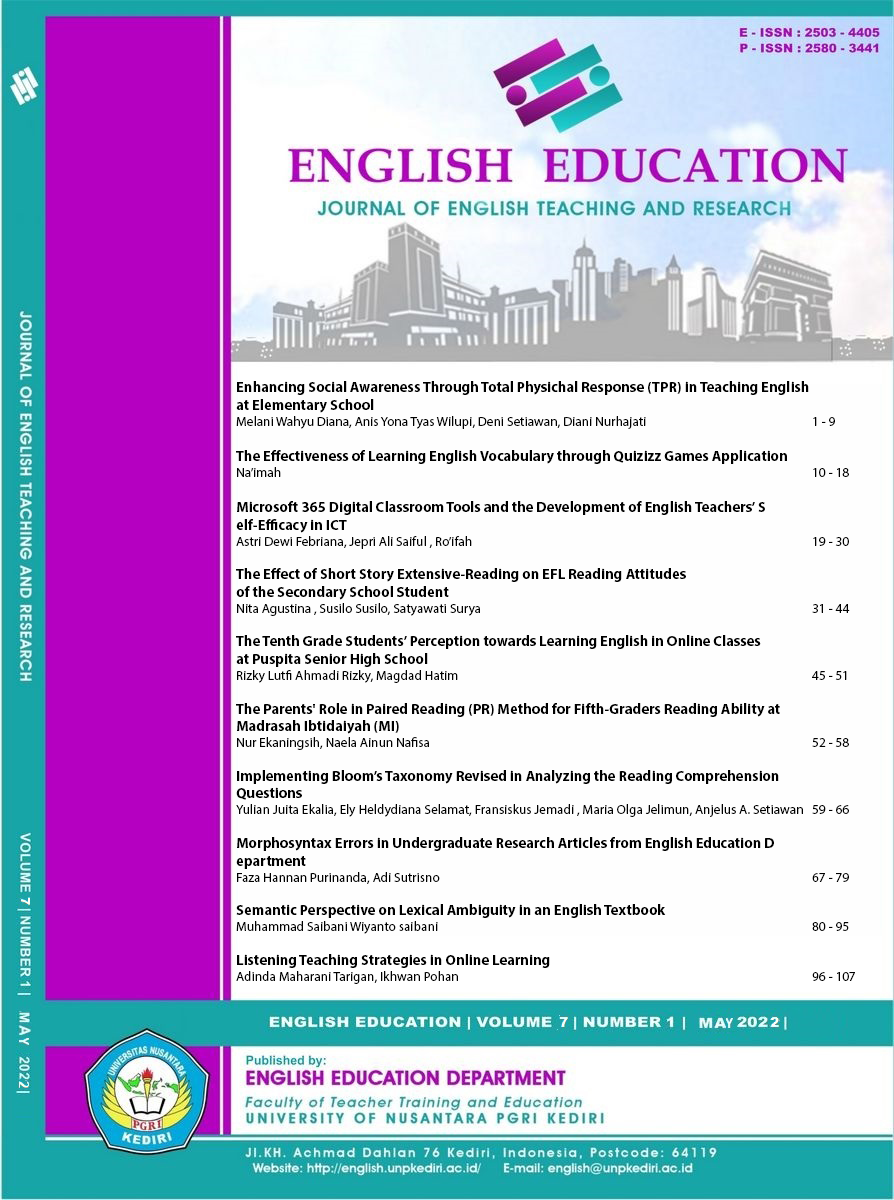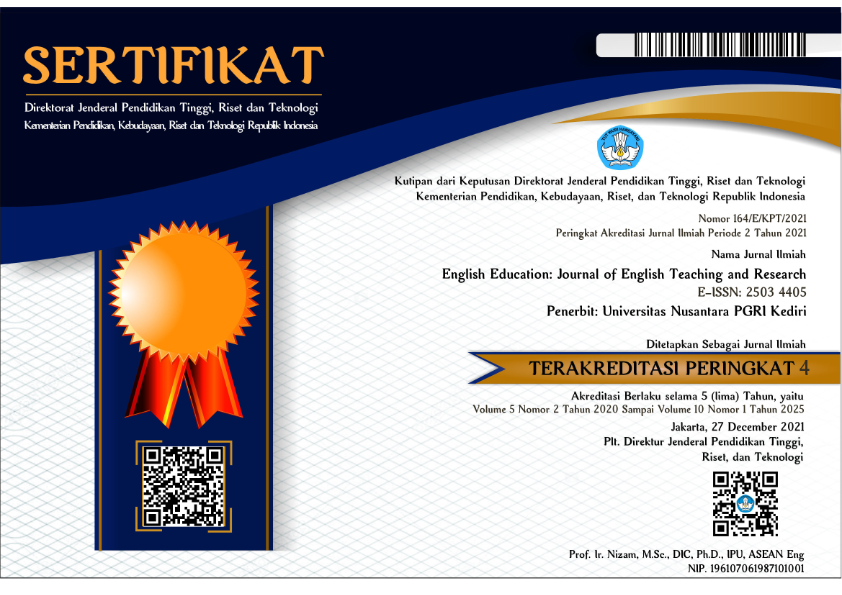The Effect of Short Story Extensive-Reading on EFL Reading Attitudes of the Secondary School Student
DOI:
https://doi.org/10.29407/jetar.v7i1.17414Keywords:
EFL Reading attitude, Secondary school student, E-short story extensive-readingAbstract
This study intends to investigate the effect of short story extensive reading on secondary school students’ EFL reading attitudes. This is an experimental study using a one-grouppretest-treatment-posttest design. The sample was 35 students, who were taken randomly from 355 Students of twelve classes in the second grade of SMAN 4 Samarinda. The researchers used a questionnaire as the instrument in this study. The questionnaire was used to obtain the data on students’ reading attitudes. To analyze the data, a series of paired t-tests and descriptive statistics were used. The results revealed that firstly, overall aspect, the short story-extensive reading gave an effect on the EFL secondary school students’ reading attitudes, t (34)= -1.229, p=0.003. Secondly, in detail per an aspect of attitude, the short story-extensive reading gave an effect on the comfort aspect in the students’ reading attitudes, t (34)= -3.610, p=0.001, the linguistic value aspect, t (34)= 0.463, p=0.646, and the anxiety aspect, t (34)= -3.762, p=0.001; In the meantime, the short story-extensive reading did not give an effect on the intellectual value aspect in the students’ reading attitudes, t (34)= -0.269, p=0.789 and the practical value aspect, t (34)= -0.179, p=0.859. Reading short stories brings about the students into a relaxed circumstance from which EFL secondary school students can browse ideas freely and excitingly. This study implies that such reading materials can be used by secondary school EFL teachers to give more reading input-rich circumstances, which finally becomes an enhancement of their reading attitudes.
Keywords:EFL Reading attitude, Secondary school student, E-short story extensive-reading
Downloads
References
Al-Homoud, F., & Schmitt, N. (2009). Extensive reading in a challenging environment: A comparison of extensive and intensive reading approaches in Saudi Arabia. Language Teaching Research, 13(4), 383–401. https://doi.org/10.1177/1362168809341508
Ceylan, N. O. (2016). Using Short Stories in Reading Skills Class. Procedia - Social and Behavioral Sciences, 232(April), 311–315. https://doi.org/10.1016/j.sbspro.2016.10.027
Day, R., & Bamford, J. (2002). Top Ten Principles for Teaching Extensive Reading 1. Reading in a Foreign Language, 14(2), 136. http://nflrc.hawaii.edu/rfl
Endris, A. A. (2018). Effects of Extensive Reading on EFL Learners’ Reading Comprehension and Attitudes. International Journal of Research in English Education, 3(4), 1–11. https://doi.org/10.29252/ijree.3.4.1
Erfanpour, M. A. (2013). The Effect of Intensive and Extensive Reading Strategies on Reading Comprehension: A Case of Iranian High School Students. English for Specific Purposes World, 41(14), 1–21. https://www.semanticscholar.org/paper/The-Effect-of-Intensive-and-Extensive-Reading-on-A-Erfanpour/c3dc07f617a147aa9f67ef34eab5f99c6aee0562?p2df
Firda, I. D. L., Widiati, U., Laksmi, E. D., & Hayati, N. (2018). Attitudes Toward Extensive Reading Among English Teachers Of Senior High Schools. Jurnal Ilmu Pendidikan, 24(1), 1–9. http://journal2.um.ac.id/index.php/jip/article/view/5363
Gladsjo, J. A., Heaton, R. K., Palmer, B. W., Taylor, M. J., & Jeste, D. V. (1999). Use of oral reading to estimate premorbid intellectual and neuropsychological functioning. Journal of the International Neuropsychological Society, 5(3), 247–254. https://doi.org/https://doi.org/10.1017/S1355617799533079
Grabe, W. (2009). Reading in a second language: Moving from theory to practice. Cambridge University Press. https://scholar.google.co.id/scholar?hl=id&as_sdt=0%2C5&q=Grabe%2C+W.+%282009%29.+Reading+in+a+second+language%3A+Moving+from+theory+to+practice.+Cambridge%3A+Cambridge+University+Press&btnG=
Grabe, W., & Stoller, F. L. (2013). Teaching and researching reading, second edition. In Teaching and Researching Reading, Second Edition (second edi). Routledge Tayor & Francis Group. https://doi.org/10.4324/9781315833743
Hadiyanto, A. K. (2019). Students’ collaborative story writing project in an extensive reading program. Teflin Journal, 30(2), 197–211. https://doi.org/10.15639/teflinjournal.v30i2/197-211
Ikaningrum, R. (2020). E-Short Story in Extensive Reading: A Survey of English Education Department Students. 2nd International Conference on Language and Language Teaching, 21–30. https://doi.org/10.4108/eai.12-10-2019.2292212
Judge, P. B. (2011). Driven to read: Enthusiastic readers in a Japanese high school’s extensive reading program. Reading in a Foreign Language, 23(2), 161–186. https://files.eric.ed.gov/fulltext/EJ943535.pdf
Manan, A. (2017). TEACHING READING COMPREHENSION BY USING SHORT STORIES. EEJ, 8(3), 404–423. https://repository.ar-raniry.ac.id/id/eprint/3168/
Ningrum, S., & Matondang, S. A. (2017). The correlation between students’ motivation and achievement in reading comprehension. The International Journal of Social Sciences and Humanities Invention, 5(7). https://doi.org/10.18535/ijsshi/v4i7.10
Safaeia, L. A., & Bulca, M. (2013). Extensive Reading and Creative Practices. Procedia - Social and Behavioral Sciences, 70, 592–597. https://doi.org/10.1016/j.sbspro.2013.01.097
Salameh, L. A. M. (2017). Investigating the effect of extensive reading on EFL learners’ reading attitudes at Hail University in KSA. Journal of Education and Practices, 8(8), 7–15. www.iiste.org
Satriani, E. (2019). Online Reading Resources among EFL (English Foreign Language) Students: Do They Promote Reading Habit? J-SHMIC (JOURNAL OF ENGLISH FOR ACADEMIC), 6(1), 1–10. https://doi.org/https://doi.org/10.25299/jshmic.2019.vol6(1).2528
Şentürk, B. (2015). EFL Turkish University Students’ Attitudes and Motivation Towards Reading in English. Procedia - Social and Behavioral Sciences, 199, 704–712. https://doi.org/10.1016/j.sbspro.2015.07.601
Spada, N., & Lightbown, P. M. (2006). How language are learned. Oxford university press.
Subandi. (2014). Indonesian curriculum development : Meaning-based curriculum and competency-based curriculum in the context of teaching English subject. The Second International Conference on Education and Language (2nd ICEL) 2014, 22, 198–205. https://www.neliti.com/publications/171688/indonesian-curriculum-development-meaning-based-curriculum-and-competency-based
Taboada, A., Tonks, S. M., Wigfield, A., & Guthrie, J. T. (2009). Effects of motivational and cognitive variables on reading comprehension. Reading and Writing, 22(1), 85–106. https://doi.org/10.1007/s11145-008-9133-y
Uden, J. (2013). The Extensive Reading Foundation’s Guide to Extensive Reading. 67(2), 270–272. https://doi.org/https://doi.org/10.1093/elt/cct010
Yamashita, J. (2013). Efffects of extensive reading on reading attitudes in a foreign language. Reading in a Foreign Language, 25(2), 248–263. https://scholarspace.manoa.hawaii.edu/handle/10125/66872
Downloads
Published
Issue
Section
License
Authors who publish with this journal agree to the following terms:
- Copyright on any article is retained by the author(s).
- The author grants the journal, the right of first publication with the work simultaneously licensed under a Creative Commons Attribution License that allows others to share the work with an acknowledgment of the work’s authorship and initial publication in this journal.
- Authors are able to enter into separate, additional contractual arrangements for the non-exclusive distribution of the journal’s published version of the work (e.g., post it to an institutional repository or publish it in a book), with an acknowledgment of its initial publication in this journal.
- Authors are permitted and encouraged to post their work online (e.g., in institutional repositories or on their website) prior to and during the submission process, as it can lead to productive exchanges, as well as earlier and greater citation of published work.
- The article and any associated published material is distributed under the Creative Commons Attribution-ShareAlike 4.0 International License








 Article template
Article template



